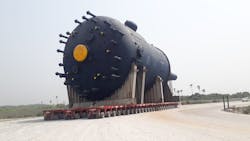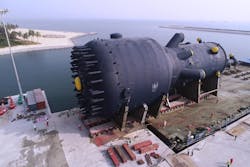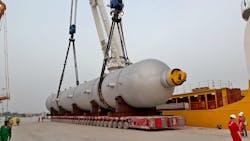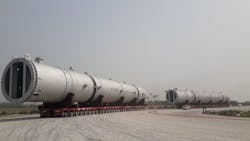Nigeria’s government to support Dangote integrated refining complex
Nigeria’s federal government has pledged to support Nigerian conglomerate Dangote Industries Ltd. subsidiary Dangote Oil Refining Co.’s 650,000-b/d long-planned, grassroots integrated refining and petrochemical complex now under construction in southwestern Nigeria’s Lekki Free Trade Zone (OGJ Online, Nov. 25, 2013).
The federal government will supply crude oil feedstock as well as other necessary but unidentified inputs to support success of the new complex, said Timipre Sylva, Nigeria’s minister of state for petroleum resources.
Show of support for the privately funded project comes amid the government’s belief that the refinery will attract more foreign direct investment into Nigeria upon its completion, as well as the important role the integrated complex will play in helping to reverse Nigeria’s reliance on fuel imports to meet domestic demand, Sylva added.
Nigeria also is in the process of establishing two 200,000-b/d condensate refineries to boost domestic refining capacity, said Mallam Mele Kyari, group managing director of state-owned Nigerian National Petroleum Corp. (NNPC).
Kyari’s confirmation of the condensate refineries follows NNPC’s August 2018 announcement that it would establish the two refineries at Western Forcados and Assah North Ohaji South (ANOH) areas of Nigeria’s Delta and Imo states, respectively (OGJ Online, Aug. 31, 2018).
Once completed, the condensate refineries—coupled with 445,000-b/sd capacity of NNPC’s existing refineries scheduled to soon be modernized—will help transform Nigeria into a net exporter of petroleum products to help guarantee the country’s energy security, Kyari said.
Kyari also stressed that NNPC was not in contest for market share with the Dangote project.
“Our objective is to make Nigeria a net exporter of petroleum products, and you can only achieve that by complementing each other, both the public and the private sector. We are going to do more, and we actually need more of these private sector refineries for Nigeria to become a net exporter of gasoline and other associated products,” Kyari said.
The complex will be equipped to produce 33 million tpy of petroleum products, including gasoline, diesel, kerosine, aviation fuel, and other petrochemicals.
Refinery rehabilitation program
Dangote’s integrated complex joins a series of other projects under way by the Nigerian government to modernize and expand capacities of refineries operated by NNPC as part of a strategy to meet Nigeria’s domestic demand for refined products and reduce its reliance on foreign imports (OGJ Online, June 22, 2017).
NNPC recently confirmed it is moving forward with the long-planned modernization of its state-run refineries in a program that will optimize processing capacities at the sites by 2022 (OGJ Online, Sept. 30, 2019).
The program for full rehabilitation of NNPC subsidiary Port Harcourt Refining Co. Ltd.’s (PHRC) Port Harcourt refining complex—which includes a 60,000-b/sd hydroskimming refinery and 150,000-b/sd full-conversion refinery—in Nigeria’s Rivers state, Warri Refining & Petrochemcial Co. Ltd.’s 125,000-b/sd refinery in Delta state, and Kaduna Refining & Petrochemical Co. Ltd.’s 110,000-b/sd refinery in Kaduna state will begin in January 2020, according to Kyari.
“[W]e will deliver this project by 2022. We will commence actual rehabilitation work in January. We will do everything possible between October and December to close out all necessary conditions for us to deliver on that project. I believe that with the support that we have from the shareholders—government of this country, the entire staff of this company, and the contractors—I believe it is doable, and we will deliver the project,” Kyari said.
“It’s no longer about business now, but a reputational issue. For the original builders of the refinery, [Maire Tecnimont SPA], Eni SPA [subsidiary Nigerian Agip Oil Co. (NAOC)], and NNPC, let us be conscious of the fact that our reputation is at stake as far as this project is concerned. The NNPC leadership has promised this country that our refineries will work, therefore, we must work not to disappoint over 200 million Nigerian stakeholders,” Kyari added.
In his presentation on the progress and milestones on Phase 1 of the projects, Tecnimont project manager Carmelo La Mattina said the inspection aspect of the project has progressed to 91%, with the project’s final report and engineering, procurement, and construction proposal now reaching 75%.
La Mattina also confirmed Tecnimont would deliver the first phase of rehabilitation project soon, assuring there were no challenges as the project continued to progress efficiently.
Daniele Tamburini, project manager for consulting company NAOC, also confirmed that work completed so far by NNPC and Technimont on the rehabilitation project complied with global standards.
Tamburini said NAOC was ready to receive the full report of the scoping for final assessment and support the corporation to deliver the project in record time.
Phased rehabilitation
Earlier this year, PHRC let a $50-million contract to Tecnimont SPA and Tecnimont Nigeria Ltd. (TNL) to carry out a complete integrity check and equipment inspections of the Port Harcourt complex (OGJ Online, Apr. 3, 2019).
Tecnimont and TNL’s scope of work under the Phase 1 rehabilitation program was to involve a 6-month assessment at site, including relevant engineering and planning activities in preparation for Phase 2 of the refinery modernization project, which will entail a full rehabilitation of the complex aimed at restoring the refining capacity to a minimum 90% of capacity utilization.
Subject to successful completion of the integrity check, Tecnimont and TNL, in collaboration with an unidentified partner, also was to execute EPC for the project’s second phase.
The two-phase PHRC revamping project forms a strategic part of NNPC’s development of Nigeria’s downstream business (OGJ Online, Jan. 12, 2017).
Eni previously entered a memorandum of understanding with NNPC to partner on PHRC’s modernization, which—alongside upstream measures that call for intensifying oil and gas production operations with an increased focus on development and exploration activities in the onshore, offshore, and ultradeepwater areas operated by Eni subsidiaries NAOC and Nigerian Agip Exploration—outlines Eni’s commitment to cooperate on rehabilitation and enhancement of the Port Harcourt manufacturing site (OGJ Online, Jan. 24, 2017).
Contact Robert Brelsford at [email protected].
About the Author
Robert Brelsford
Downstream Editor
Robert Brelsford joined Oil & Gas Journal in October 2013 as downstream technology editor after 8 years as a crude oil price and news reporter on spot crude transactions at the US Gulf Coast, West Coast, Canadian, and Latin American markets. He holds a BA (2000) in English from Rice University and an MS (2003) in education and social policy from Northwestern University.




